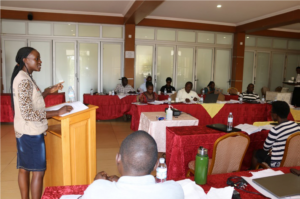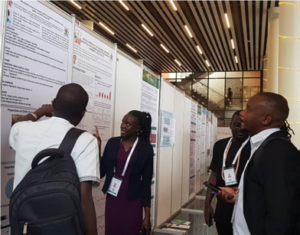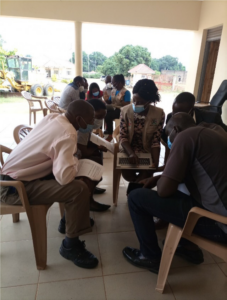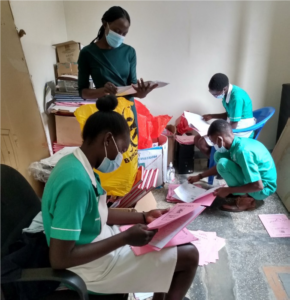 |
Stella Martha MigambaBSN (MUST), MPH (MUK), Advanced Field Epidemiology Fellow (UNIPH) Host Site: Reproductive and Infant Health Division, Ministry of Health
|
||||
ABOUT THE FELLOWStella Martha Migamba is a field epidemiology fellow with special interest in Maternal and Child health, as well as disease emergency preparedness and response. She holds a Master of Public Health from Makerere University and a Bachelor of Science in Nursing from Mbarara University of Science and Technology. Before joining the fellowship programme, she worked with the Infectious Diseases Institute and University Research Co., LLC, USAID RHITES EC where she implemented projects in HIV and Maternal Child Health. During the fellowship, she was attached to the Reproductive Health Department of the Ministry of health where she conducted mentorships, support supervisions, and contributed to writing of national reports, workplans, and guidelines. She has authored a number of documents that demonstrate advanced scientific writing skills, including bulletin articles, newspaper articles, manuscripts, and website articles which enhanced her writing skills. She is also a mentor and trainer with the FETP Intermediate Program, and a trainer with the FETP Frontline Program. Achievements at the Host Site
Fellowship program specific achievements
Conducted a descriptive analysis to determine the trends and spatial distribution of in-patient neonatal sepsis in Uganda from 2016 to 2020
Implemented a quality improvement project in Iganga Hospital to improve perinatal deaths notification and review (June to November 2022).
Conducted an HIV project to assess the effect of point-of-care (POC) early-infant diagnosis testing (EID) on HIV results turnaround time and linkage to antiretroviral therapy at 10 health facilities. Epidemiological studies
Outbreak investigations
Other projects
Public Health evaluations Participated in:
Conference presentations
Written Communication Bulletin articles
Newspaper articles
Website article
Manuscripts Lead author
Co-author
Summary of Epidemiological Study:Title: Risk factors associated with deaths among hospitalized pregnant women with COVID-19 in Uganda, June 2020 to August 2021 Authors: Stella M. Migamba1, Bruno Ssemwanga2, Allan Komakech1, Benon Kwesiga1, Daniel Kadobera1, Lilian Bulage1, Alex R. Ario1, Julie R. Affiliations 1Uganda Public Health Fellowship Program, Uganda National Institute of Public Health, Kampala, Uganda 2Reproductive and Infant Health Department, Ministry of Health, Kampala, Uganda 3Division of Global Health Protection, U.S. Centers for Disease Control and Prevention, Kampala, Uganda Background: Pregnant women are at higher risk than other COVID-19 patients for severe COVID-19 disease. Few studies have been done to understand risk factors for death among COVID-19- infected pregnant women in Africa. We investigated risk factors for death among hospitalized pregnant women with COVID-19 in Uganda. Methods: We abstracted demographic and clinical characteristics from files of pregnant women admitted during any trimester with confirmed SARS-CoV-2 infection at eleven hospitals in Uganda. We conducted an unmatched case-control study among hospitalized pregnant women with COVID-19 during June 2020-August 2021; cases were those who died while controls were those who recovered and were discharged during the same period. We enrolled 33 cases and 109 controls. We analysed risk factors for death using multivariable logistic regression adjusted for age, trimester, parity and presence of comorbidities because these factors have previously been associated with COVID death or maternal death. Results: Of 33 cases and 109 controls, 32 (97%) cases and 73 (67%) controls were hospitalised in 2021 (p=0.01). Thirty-two (97%) cases and 85 (78%) controls had COVID-19 symptoms at admission (p=0.04). Nineteen (58%) cases and nine (8%) controls had severe or critical COVID-19 disease at admission (p<0.001). The median length of hospitalisation for cases was 3 days (IQR: 1-6) while that for controls was 7 days (IQR: 4-11) (p<0.001). Odds of seeking care from another medical facility before admission were higher among cases than controls (ORunadjusted= 3.0, 95% CI: 1.1-7.9). Having severe disease at admission increased odds of death (ORadj= 16, 95% CI: 4.0-69), while admission for ≥ 6 days was protective (ORadj= 0.15, 95% CI: 0.03-0.81). Conclusion: Pregnant women with COVID-19 who died had higher odds of being admitted with symptomatic, severe disease compared with those who survived. Earlier facilities cases visited could have delayed referral to the hospitals where they died few days after hospitalisation. Orienting facilities on referral of pregnant women with COVID-19 could improve their clinical outcomes. Keywords: COVID-19, pregnant, hospitalized, death, risk factors, Uganda Key lessons learnt during the fellowship
|
|||||
|
|
 participants during workshop two in Jinja City, July 2022
|

|
|


